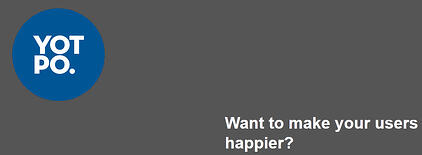
The Best and Worst Experiences
During the Startup of Yotpo
As a first time founder for a new Internet startup there was the good and bad experiences. I would like to share a few of them and hope they will prove to be valuable for other first time founders. (I just finished my first seed investment round.) I talked with so many young, highly motivated first time entrepreneurs and I realized that many of us have similar problems.
Here are a few of my "best" and "worst" experiences so far from a perspective of a first time founder of a new Internet startup:
Best - Consuming:
By far one of the best and "must do" for a first timer. I know most of you are the smartest people on earth but guess what, there are a lot of smarter people out there. They already succeeded and failed many, many times. I spend hours every week online consuming new information from people who I can actually say changed the way Yotpo (my startup) will launch and behave. Here is a quick list of blogs I think every first timer must read (for starter): Steve Blank, Brian Solis, Michael Hartzell, OnStartups, Eric Reis, For Entrepreneurs. Here are the best videos from the Ycombinator's house: Ycombinator's videos. Now don't underestimate these guys, they are willing to share some of the most valuable info I have ever read.
Worst - Consuming:
The bad thing is that there are soooo many blogs for entrepreneurs and 90% of them repeat themselves and are a waste of time. My advice is to start with a couple of blogs you like and then read who your favorite bloggers recommend. My rule is that I read blogs of people who I would like to have on my advisory board, actually I really consider them part of my imaginary advisory board (a bit crazy I know) and try to listen to everything they say.
Best - Production:
One of the first things I learned is that we work in a different time zone than anybody else. This means that if a potential investor wants an executive summary/marketing plan or anything else, we make it happened as fast as we can and in most cases a lot faster than the response time. This fact is true with subcontractors, potential early adaptors of your product or anyone else you will be in contact with. It is very, very frustrating but you will learn that is how the world works. Instead of wasting your energy on trying to get everyone else to move faster, you should focus on production. I can't say how important it is but the reason I believe we succeeded with raising our seed money so fast (6 weeks but it really felt like 6 years) is that we already came with a working system. It was in a small scale and had a lot of bugs, but it was a working system. Our main focus is production because I really believe every startup is based on 10% ideas and 90% execution.
Best - Mistakes:
One of the strangest things I learned is that mistakes happen. I know it sounds a bit dumb when I say it but I'm not used to making so many mistakes in such a short amount of time. This is actually a really good thing because I think mistakes comes from doing something for real. Not from planning, not from presenting but actually doing. I'm a huge fan of the Lean startup approach, here is the best video I saw regarding that: Lean Startup.
Worst - Listening to big people with big words:
Because we are first timers and we are now just starting our networking we tend to go and consult with some important people our family and friends can arrange for us to meet. Don’t get me wrong, that is a good thing (all of our investors are angels) but listening to each one of them, or even most of them is bad, really bad. I met with a lot of first timers who changed their mind after every meeting they had and listened to people with big words like: "dilution, definitive agreement, IPO" and a bunch of other non-important words. In my experience those people know less than you on your market and product, but they make you think about your business model and how you are going to make money from the first day.
Worst - "If everyone will use it then…"
A little news-flash: Almost every product/service in the world would be awesome if half of the world would use it. One of the basic characteristics an entrepreneur has is to be a visionary. With all of the ups and downs, it is an extremely important characteristic to have, but most of the first timers forget to think about how they are going to get there. Focus on how you get your first investor and how you get your first user, these are the problems you are going to face in the coming years.
Overall, these are the best and worst I saw and experienced as a first time founder. I'm sure this is just the beginning but trust me when I say that you will have much more "best" and "worst" on your own. Do you have something to add to these?
Please contact me with any question: Twitter, LinkedIn
My new Startup for your review to check: Yotpo
Tomer Tagrin